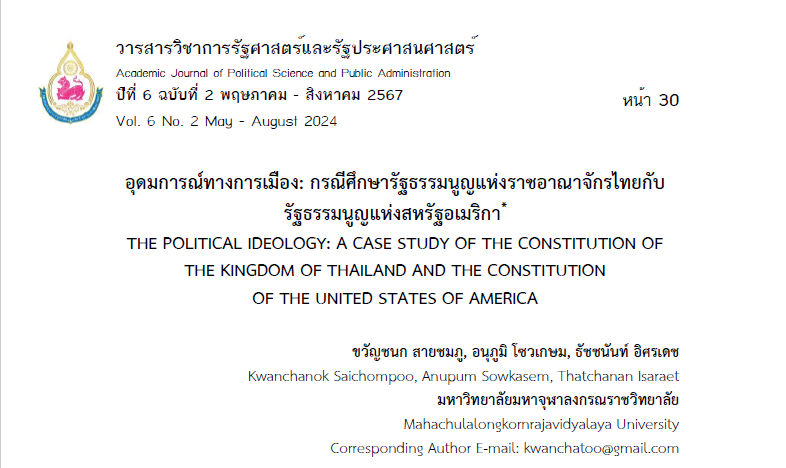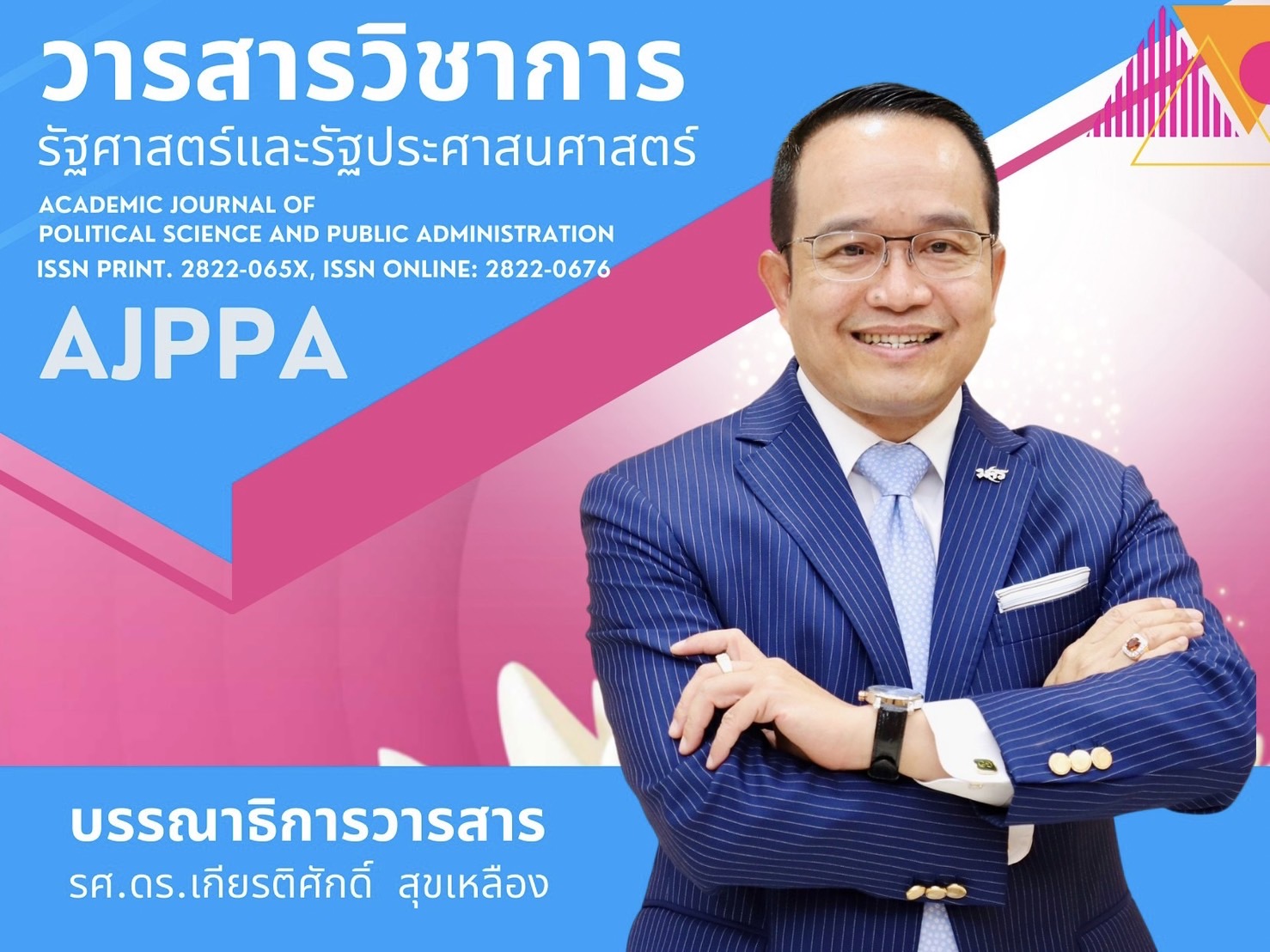อุดมการณ์ทางการเมือง: กรณีศึกษารัฐธรรมนูญแห่งราชอาณาจักรไทยกับรัฐธรรมนูญแห่งสหรัฐอเมริกา
คำสำคัญ:
อุดมการณ์ทางการเมือง, รัฐธรรมนูญ, อริยสัจ 4บทคัดย่อ
การวิจัยนี้มีวัตถุประสงค์ 3 ประการ คือ 1. เพื่อศึกษาอุดมการณ์ทางการเมือง 2. เพื่อศึกษาเปรียบเทียบระหว่างรัฐธรรมนูญแห่งราชอาณาจักรไทย พุทธศักราช 2560 และรัฐธรรมนูญแห่งสหรัฐอเมริกาในด้านอุดมการณ์ทางการเมือง และ 3. เพื่อการประยุกต์ใช้หลักอริยสัจ 4 ในการเสริมสร้างอุดมการณ์ทางการเมืองของไทย โดยวิธีการดำเนินการวิจัยเชิงคุณภาพ ศึกษาจากสถานการณ์และความคิดเห็นและกิจกรรมทางการเมืองจากสื่อสาธารณะเพื่อหาความแตกต่างของรัฐธรรมนูญแห่งราชอาณาจักรไทย พุทธศักราช 2560 และรัฐธรรมนูญแห่งสหรัฐอเมริกาในด้านอุดมการณ์ทางการเมืองผ่านมุมมองสถาบันนิติบัญญัติ
ผลการวิจัยพบว่า 1. อุดมการณ์ทางการเมืองเกิดจากการรวมตัวกันของความคิดของหมู่คนที่เห็นพ้องกันหรือประโยชน์ร่วมกันในการดำเนินการทางการเมืองและส่งผลต่อการปกครองของประเทศที่ปรากฏอยู่ในรัฐธรรมนูญแห่งรัฐ 2. การเปรียบเทียบอุดมการณ์ทางการเมืองของไทยและสหรัฐอเมริการมีความแตกต่างกันจากปัจจัยเหตุในการเริ่มต้นร่างรัฐธรรมนูญของทั้งสองฉบับ และนำไปสู่ประเด็นปัญหาในรัฐธรรมนูญแห่งราชอาณาจักรไทย พุทธศักราช 2560 ในอำนาจนิติบัญญัติ 4 ประเด็น 3. หลักอริยสัจ 4 เป็นหลักธรรมพื้นฐานในการร่างรัฐธรรมนูญที่ดีภายใต้กรอบกฎหมายและเป็นหลักธรรมในการเสริมสร้างอุดมการณ์ทางการเมืองที่เหมาะสมต่อการปกครองของรัฐ
เอกสารอ้างอิง
กาญจนา แก้วเทพ. (2557). อุดมการณ์และกลไกทางอุดมการณ์ของรัฐ (พิมพ์ครั้งที่ 2). กรุงเทพฯ: เครือสยามปริทัศน์.
ฐิติกร สังข์แก้ว. (2566). อ่านความเป็นพลเมืองในรัฐธรรมนูญแห่งสหรัฐอเมริกา : บริบทเชิงนิติประวัติศาสตร์และภาคปฏิบัติการทางการเมือง. วารสาร Veridian E-Journal, 6(1), 749-769.
นรชัย ณ วิเชียร และคณะ. (2562). อริยสัจ 4 กับการพัฒนาองค์การ. Journal of Humanities and Social Sciences Thonburi University, 13(1), 165-174.
พชรวัฒน์ เส้นทอง. (2562). อุดมการณ์ทางการเมือง: อุดมการณ์ทางการเมืองไทย. วารสารบัณฑิตศึกษา มหาวิทยาลัยราชภัฏวไลยลงกรณ์ ในพระบรมราชูปถัมภ์, 13(3), 231-242.
สมบูรณ์ ตาสนธิ. (2560). กระบวนการบรรลุอริยสัจ 4 ของพระอริยบุคคล (ดุษฎีนิพนธ์พุทธศาสตรดุษฎีบัณฑิต สาขาวิชาพระพุทธศาสนา). พระนครศรีอยุธยา: มหาวิทยาลัยมหาจุฬาลงกรณราชวิทยาลัย.
สมภพ ระงับทุกข์. (2560). อุดมการณ์ทางการเมืองแบบประชาธิปไตยของนักศึกษาและคณาจารย์. องค์การปกครองท้องถิ่นไทย: กรณีศึกษามหาวิทยาลัยมหามกุฏราชวิทยาลัย. วารสารสถาบันวิจัยญาณสงวร, 8(2), 285-298.
สัญญา เคณาภูมิ และเสาวลักษณ์ โกศลกิตติอัมพร. (2561). การพัฒนาวิถีประชาธิปไตยด้วยกระบวนการเสริมสร้างอุดมการณ์แบบประชาธิปไตยฐานคติหุ้นส่วนทางการเมืองในจังหวัดมหาสารคาม (รายงานการวิจัย). มหาสารคาม: มหาวิทยาลัยราชภัฏมหาสารคาม.
สำนักงานเลขาธิการสภาผู้แทนราษฎร. (2562). ความมุ่งหมายและคำอธิบายประกอบรายมาตราของรัฐธรรมนูญแห่งราชอาณาจักรไทย พุทธศักราช 2560. กรุงเทพฯ: สำนักงานเลขาธิการสภาผู้แทนราษฎร.
Simon, R.R. (1982). Gramsci’s Political Thought. And Introduction. London: Lawrence and Wishart.

ดาวน์โหลด
เผยแพร่แล้ว
รูปแบบการอ้างอิง
ฉบับ
ประเภทบทความ
หมวดหมู่
สัญญาอนุญาต
ลิขสิทธิ์ (c) 2024 วารสารวิชาการรัฐศาสตร์และรัฐประศาสนศาสตร์

อนุญาตภายใต้เงื่อนไข Creative Commons Attribution-NonCommercial-NoDerivatives 4.0 International License.




